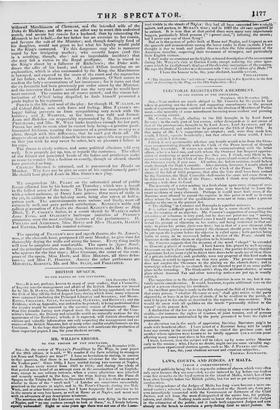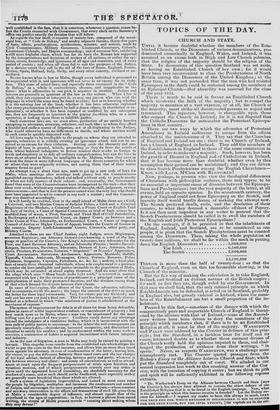LAWS, COURTS, AND JUDGES, AT MALTA.
[FRO]t A CORRESPONDENT.)
General publicity being the first step to the reform of abuses, which very often only exist because they are concealed, we are induced to lay before Our readers some few remarks on the legal system in the island of Malta, which has of late been often brought before the British public, but has not as yet undergone any amelioration.
Thif independence of the Judges of Malta has long since become a mere no- minal matter ; selected, as the individuals elevated to the Bench arc, from per- sons immediately connected with the Government or flatterers of the Chief Justice, and nut from the most distinguished of the entire bar, for probity, talents, and ability. Nothing tends more to lower the character of the Judges in the estimation of the public, and it leads both expectant Judges and men already on the bench to entertain a party-feeling fatal to attics justice. Se well established' is the fact, that it is notorious, whenever a question comes be- fore the Courts connected with Government, that every clerk. lathe Secretary 's race can predict exactly the decision that will follow. As regards the law itself, it consists of statute-law, composed of the muni- cipal law, or " Code de Rohan," and sundry adjuncts thereto, thirty-five years of bans, edicts, proclamations, notifications, minutes, and notices, made by Civil Commissioners, Military Governors, Lieutenant-Governors, Colonels, Lieutenant-Colonels, and Majors commanding ; and of common law, exhibiting a still more frightful chaos, which has for its basis the Roman law supported by the interpretations and decisions of writers of all nations, or rather the opi- nions, errors, knowledge, and ignorance of all ages and countries, and of every period of society ; and when all these fail to suit the purposes of the Judges, as a dernier resort they call in the aid of the laws of Rome, England, France, Venice, Spain, Holland, Italy, Sicily, and every other country, civilized or un- civilized.
No one knows what is law in Malta, though every individual is presumed to be acquainted with it, and ignorance will not serve as an excuse for its viola- tion. This mass of mixed laws, and especially those contained in the " Code de Rohan," as a whole is contradictory, obscure, and inapplicable to the times : what is affirmative in one part, is negative in another. Judges and lawyers are generally as ignorant of the law as the suitors. When a law is cited, they can expound or interpret it, so may any person who can read the language in which the same may be found to exist ; but as to knowing whether it is the existing law of the land, whether it has been otherwise explained (for every proclamation is followed by half-a-dozen others, in elucidation or ex- planation), or whether it has been repealed or modified by any subsequent one, they are frequently as ignorant as the gaping facchino, who, as a mere spectator, is looking upon them as infallible guides.
Such numerous laws are, we must allow, productive of no earthly benefits excepting to advocates, attornies, solicitors, and such like ; to whom they afford a fruitful and endless source of litigation, not at all displeasing to the Judges, who would otherwise have no differences to decide, and whose services would in such cases be quickly dispensed with.
i All laws ought to be intelligible to the people on whom they are intended to operate, otherwise it is wilfully creating an ignorance which will not he re- ceived as an excuse for their violation. Setting aside the obscurity and am- biguity of laws in general, which, proceeding as they do from the minds of men whose habitual indulgence to fiction renders their works so foreign to
truth and simplicity as to defy all ordinary comprehension, how can the laws in force at, or ad-opted in Malta, be intelligible to the Maltese, when they exist in at least the dozen or more different languages of the divers countries for which or where they were originally written, and among these that of their native country forms no part? An attempt was, a short time ago, made to get up a new code of laws for Malta, when meetings after meetings took place; but the Commissioners squabbled among themselves, talked and talked without end, as people mostly do when not fully masters of their subject : and, eventually, the Government found that some of the Commissioners were incompetent to the task—that their ideas were crude, without any concentration of thought, skill, judgment, or even common sense—and that in fact the persons named were the very last who should have been appointed to act in concert in any such a matter; and the Commis- sion was dissolved accordingly. It will hardly be credited, that in the small island of Malta there are a Civil, a Criminal, and two Marine Courts of Judicial Police, a Civil and a Criminal Magistracy of the Markets, a Criminal Court, a Piracy Court or English Trial by Jury of twelve, a Court of Special Commission or trial of high crimes by a modified Jury of seven, a First, Second, and Third Hall of Civil Jurisdiction, a Bankruptcy and a Commercial Court, an Appeal Court, an Instance and a Prize Court of Vice-Admiralty, an Ecclesiastical Court, a Court of Supreme Council of Justice or Higher Court of Appeal, besides the Courts of Session in the country, Deputy Lord-Lieutenants' Courts, Coroner's, other petty, and Military Courts. Attached to these are one Chief Justice, eight Judges, seven Magistrates, seventeen Registrars, one Attorney. General (not knowing a word of the Ian- page or practice of the Courts), two King's Advocates, two Advocates for the Poor, one Land Revenue Attorney, and an Admiralty Proctor ; besides Record- Keepers, Secretaries, Barristers, Advocates, Doctors of Law, A ttornies, Soli- citors, Proctors, Procurators, Notaries, " Stipolanti " or Notaries' Apprentices, Court Accountants, Surveyors, Auctioneers, Appraisers, Marshals, Bailiffs, Tipataffs, Clerks, Assistants, Messengers, Criers, Porters, Runners, Police Adjutants, Sergeants, Captains, Patrolmen, &c. &c. &c. • making a legal pha- lanx of nearly three thousand individuals, whose sole employment is a pretence to render the laws intelligible and justice attainable to the population of Malta, which may be estimated at about eighty thousand. And we must allow that the adage which says "Many hinds make light work," is reversed in matters connected with law ; for the swarm of practitioners is a principal cause of the multiplication of suits, their protracted duration, and the division among them of that which formed the dispute between their clients. In cases of bankruptcy, the officers of the Court, the advocates, solicitors, and accountants, divide the assets ; the larger the amount of the debts so much the better fur these legal cormorants. Very few estates pay any dividend ; and only one has ever yet paid a final one. This Court has been very justly charac- terized as a tribunal in which "the minimum of justice is administered at the maximum of expense."
The system of imprisonment for debt is at all times far from being defensible, unless in cases of wilful improvident conduct, or concealment of property ; but how much more so in Malta, where a man can be imprisoned for the most trifling sum for a period of two years Creditors rarely derive any advantage beyond the indulgence of a vindictive feeling, which it is inconistent with the true ends of public justice to encourage : to the debtor the evil consequences are peculiarly remarkable,—degradation, increased incapacity, and diminished in- clination to satisfy his creditor ; and by confinement within the same walls as convicts, a contraction of habits is acquired inconsistent with future integrity and industry. As to the cost of litigation, a man in Malta may truly be ruined by gaining a lawsuit. This singular issue results front the established rule which obliges the victor to pay the costs in the first instance, and allows him no more than taxed costs against his adversary in case of condemnation of the latter ; leaving him, the victor, to pay the difference between these taxed costs and the law charges of his legal adviser, instead of allowing, between party and party, whatever is fair between attorney and client : and surely all consultations, as well as attend- ances at court upon the frequent postponement of trials upon frivolous and vexatious motives, and of which postponements scarcely ever any notice is given until the appointed hour of assembling, are absolutely necessary for the conduct of a cause, and as such should not be disallowed, more especially as they are generally more beneficial than those which are allowed.
Such a system of legislation impoverishes, and indeed in most cases ruins the people by litigation, multiplies and increases the emoluments and number of Judges, and encourages the mercenary profession of lawyers,—whose constant and nectss.ary intervention in the affairs and transactions of civil life gives them at Malta a considerable degree of influence, and almost equals that of the priesthood in the ages of superstition : in fact, to borrow a phrase from sacred writing, the streets of Malta present crowds " roaming about seeking whom they may devour!"



























 Previous page
Previous page